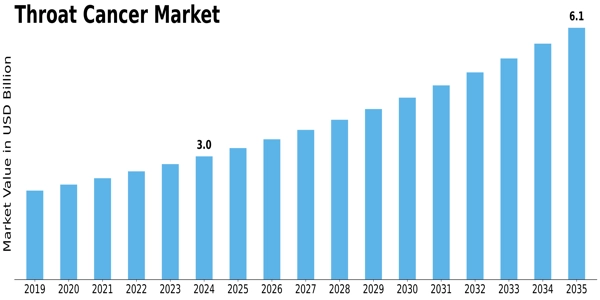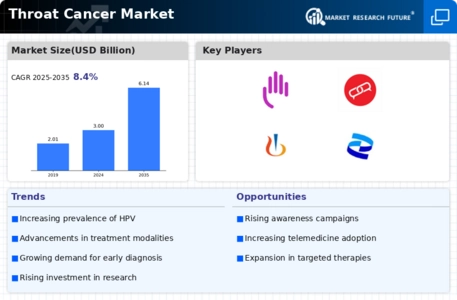Drivers
The expanding elderly population is a primary driver of the Throat Cancer Market Outlook. The prevalence of throat cancer, alcohol consumption, and an increase in HPV infections are the primary reasons driving the growth of the market in the forecast period, with an increase in the smoking population in emerging countries. Increasing disposable incomes, which leads to an increase in people's healthcare spending, increased demand for diagnostic imaging, advancements in treatment techniques, and the inclusion of novel technologies in diagnostic equipment will all contribute to market value.
Restraints
A lack of targeted/specific medications to treat throat cancer, as well as the side effects of standard chemotherapy drugs and a lack of adequate illness detection, are some of the challenges that may stymie the throat cancer market share shortly. The low adoption rate of digital technology-based systems, traditional CT and MRI scanners, excise duty placed on the sale of medical devices in mature markets, a shortage of skilled experts to operate the instruments, high treatment costs, and a lack of public awareness are also the major reasons for the restaining of the market.
Because of technological developments and advanced research, the Throat Cancer market has a lot of promise. Companies are focusing on throat cancer diagnosis and therapy, as well as novel treatments. CT scans, PET scans, needle biopsy, MRI scans, thoracoscopy, and mediastinoscopy are presently used to diagnose throat cancers. Additionally, the principal therapeutic options for throat cancer removal include surgery and chemotherapy. The technique and process of making visual representations of the interior of a body for clinical examination and medical intervention, as well as visual representations of the function of specific organs or tissues, is known as medical imaging (physiology).
The squamous cells that line the mouth, nose, and throat are the most common sites for throat cancer. Head MRI, CT of the sinuses, head CT, panoramic dental x-ray, dental cone beam CT, PET/CT, or chest imaging are some of the most common methods used to confirm a cancer diagnosis and assess if it has spread.
Study Objectives
The study provides for the complete structure of the market, as well as forecasts for the main segments and sub-segments of the market, and also gives information on the elements that influence the growth of the market.
The objective of the study is to provide a competitive landscape for the throat cancer market by providing an overview of key companies and their strategic profiling in the market, completely analyzing their core strengths, and developing a competitive landscape.
Throat Cancer Market Segmentation
Throat Cancer types outlook
Pharyngeal Cancer Laryngeal Cancer
Throat Cancer treatment types outlook
Surgery Radiation Therapy Targeted Therapy Chemotherapy Antimetabolites Platinum Derivatives Plant derivatives Nitrogen Mustards Antibiotics Others
Throat Cancer end-user outlook
Hospitals Cancer Research Institutes Multispecialty Clinics Ambulatory Surgical Centers
Throat Cancer Market Regional Classification
North America has the largest throat cancer market in the world. Throat cancer accounts for about 4% of all malignancies in the United States, according to the National Health Institute. Men are found to be more than twice as likely as women to have this sort of cancer. During the historic forecast period, more than 65,000 men and women in the United States were diagnosed with throat cancer, according to the researchers. As a result, the market's expansion will be aided by this massive disease burden.
Europe is the second-largest market for throat cancer after the United States, and it is predicted to increase quickly in the coming years. Diagnostic imaging is in higher demand, and treatment models are seeing breakthroughs and innovations, all of which contribute to the overall market's growth. The Asia-Pacific region is predicted to develop at the quickest rate in the throat cancer market. As a result, the growing elderly population worldwide, as well as government and private sector initiatives, are some of the main drivers driving the market forward.
Throat Cancer Market Competitive Landscape
The majority of throat cancer testing equipment is produced by global major vendors. Industry leaders have built their position in the market by investing more in research and having a better distribution system. Furthermore, due to increased awareness, some small players are emerging throughout Asia-Pacific. This has also aided the market's expansion. The major key players of the market are as follows:
Amgen Inc. Celgene Corporation Eli Lilly and Company Engeneic Ltd Bristol-Myers Squibb Hoffmann-la Roche AG Merck & Co., Inc. Moderna Inc. Novartis eTheRNA Pfizer Inc. Teva Pharmaceutical Industries Ltd Others
Recent Developments
The European Commission awarded eTheRNA, a Belgian immunotherapy business, a EUR 6.9 million grant to speed the clinical development of mRNA-based vaccinations for throat cancer.
Moderna Inc. released interim results from the expansion cohort of its ongoing Phase 1 study of its mRNA personalized cancer vaccine (PCV) mRNA-4157 in combination with Merck's Keytruda, showing that the vaccine candidate is well tolerated at all dose levels and produces responses as measured by tumor shrinkage in HPV (-)Head and Neck Squamous Cell Carcinoma (HNSCC) patients.
Throat Cancer Market Report Overview
<p>The increasing prevalence of throat cancer, coupled with advancements in diagnostic technologies and treatment modalities, underscores a critical need for enhanced healthcare strategies and public awareness initiatives.</p>
National Cancer Institute








Leave a Comment